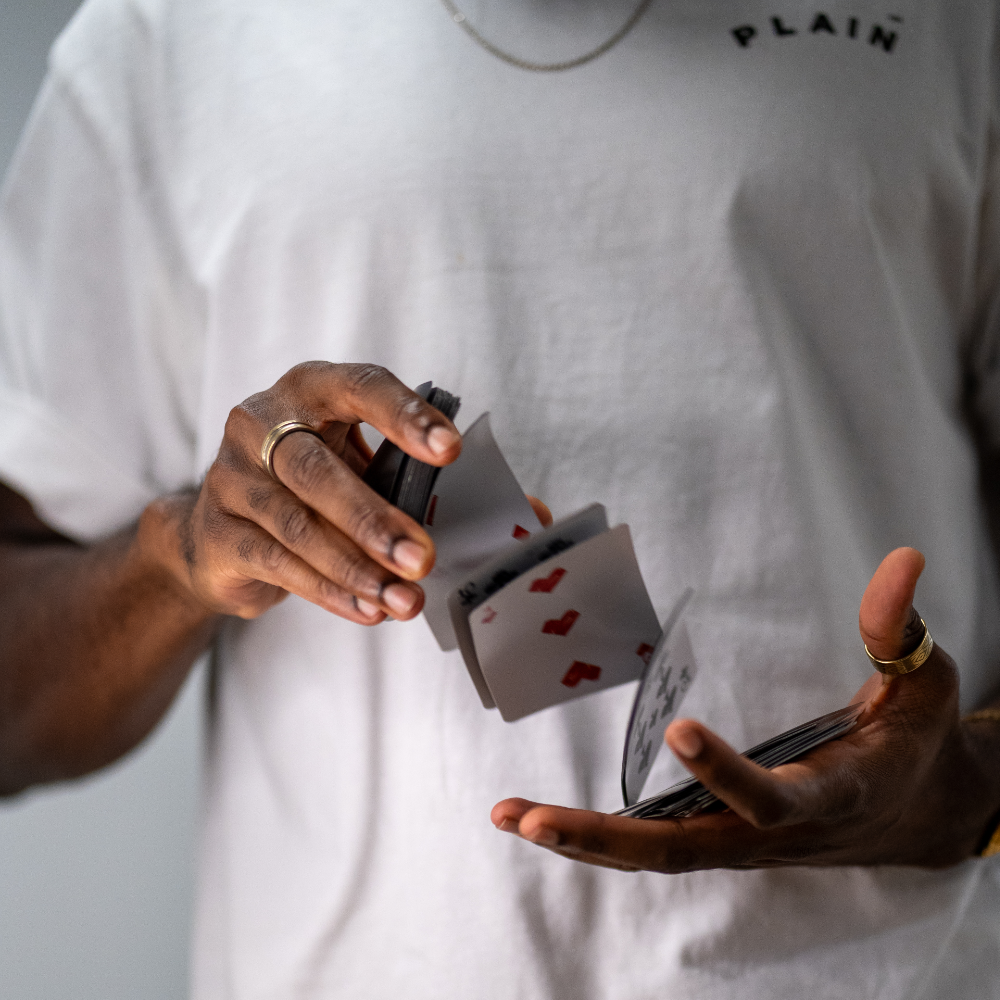Ayo Adedeji
The Plain Shop
Ayo Adedeji The Plain Shop
In the crowded world of streetwear and lifestyle brands, Ayo stands out not only for his creativity but for his passion for bringing inclusivity and authentic Black representation into his products. As the founder of a London-based lifestyle brand The Plain Shop, Ayo’s journey from the corporate banking world to creative entrepreneurship is a testament to his drive and commitment to his values. His work, ranging from sustainable clothing to unique playing cards featuring Black characters, is a celebration of Black culture and a critique of the often-limited portrayals of Black people in mainstream media.
Photos by By Haych
Rooted in Purpose
Making the move from his full-time job to setting up The Plain Company felt right for Ayo from the beginning. He struggled to feel aligned with the values of the world he was working in, particularly their role in the larger socioeconomic system. He explains, “I just felt wrong. It wasn’t my calling to make rich people richer. I quit my job, and it started with print-on-demand T-shirts.” Ayo’s decision to leave a stable job was risky, but it allowed him to follow a path that felt more authentic. What began as a small T-shirt business has since evolved into something much bigger, both in scope and purpose.
Ayo’s brand is not just about fashion; it’s about fostering an inclusive lifestyle. He focuses on simplicity, sustainability, and representation, using organic cotton and recycled materials to create minimalist designs that meet Fair Wear guidelines. The brand quickly expanded from T-shirts to jumpers, hoodies, and beanies, but Ayo was keen on making his work about more than just apparel.
Challenging Representation Through Design
One of Ayo’s standout products is a set of playing cards, each featuring Black characters. The idea was born from a moment of reflection while playing cards one day. “I realised I’d never seen Black people on playing cards,” he says. “It was a missed opportunity to add some diversity to a familiar product.” This realisation sparked what would become one of his most successful ventures, creating a deck of cards that incorporated Black characters and reimagined the traditional symbols of Kings, Queens, and Jacks.
Each suit in Ayo’s deck tells its own story. He has a passion for character design and worked carefully with a designer on each card. He wanted to make sure that the characters looked like they belonged in the same world, in contrast to the often interchangeable and generic designs of traditional playing cards. “I wanted each kingdom to look like they were from the same place,” he says, describing how he gave each suit a cohesive aesthetic. “There’s a story to be made out of a kingdom of hearts and a kingdom of diamonds and how they could potentially clash and interact.” Each of the characters wears clothing from The Plain Apparel too, building out the world of the brand.
The cards quickly gained attention, becoming one of his brand’s most popular products. But for Ayo, the cards represent something bigger, a step toward more authentic, inclusive storytelling. “I’ve always loved animation and fictional characters,” he says, explaining how his love for storytelling and design translated into the creation of The Plain Royals. The cards are not just a product; they are a way for Ayo to offer a fresh perspective on what representation can look like in everyday objects.
To learn more about the cards, and characters, Ayo has been on a journey to run a pop-up in every borough in London talking to people to get feedback first-hand from people to see how he can grow and develop the characters, product, and the world. With just five boroughs left (Havering, Redbridge, Sutton, Kingston and Croydon) he’s excited to get them completed as soon as possible. “One of the hardest parts is that you have to live in the borough or be connected with them to take part in a market there. But I've got a table, I've got all my stuff, if needed I will just go to the side of the road and sell my stuff until the police come.”
“I realised I’d never seen Black people on playing car. It was a missed opportunity to add some diversity to a familiar product.”
Building a Business with Values
Ayo’s approach to business is grounded in social responsibility. His brand is as much about making a positive impact as it is about making money. “There’s a market for playing cards - $18 billion dollars annually - but not a lot of people differentiate them,” he notes. By combining a strong sense of purpose with a marketable product, Ayo has managed to find success while staying true to his values.
His process to create products is rooted in his socialist values too. “With the artist who drew the characters, the capitalist process would be for me to have her draw those characters and either continue working with her or have that be it. I want these characters to be the future of the business and she had a huge part in making those, so she gets royalties off of each pack of cards sold.” This approach gives his company a more community feeling, bringing other creators into the process.
Ayo is also committed to using his platform to give back to the community. In addition to running his business, he leads sustainable entrepreneurship workshops for secondary school students. He’s passionate about teaching young people, particularly those from lower socioeconomic backgrounds, how to start their own businesses and break away from the traditional worker mentality. “The education system teaches people how to be workers, not how to create their own business,” he says. Through his workshops, Ayo shows students that entrepreneurship is a viable path, especially when approached with sustainability and social responsibility in mind.
Black Stories in Fantasy
Ayo’s vision extends beyond fashion and playing cards. He is also developing a graphic novel series, Plain Royals, a mediaeval fantasy story featuring the characters on his cards, another space where Black representation has been sorely lacking. “Black media is often very monolithic… I wanted to widen that. I wanted to see us in different spaces,” Ayo explains. His graphic novel aims to bring Black characters into a genre typically dominated by white narratives, offering a fresh and much-needed perspective in the world of fantasy storytelling.
The first volume of Plain Royals has been in development for three years, and Ayo is determined to release it with full creative control. “I could have released it a year ago or two years ago, I could have, but it would have been bad. I want to take my time and do it right,” he says. His meticulous approach reflects his commitment to authenticity and his desire to see Black stories told with care and depth. His long-term goal is to adapt the graphic novel into an animated series, continuing his passion for character design and storytelling.
Leading by Example
Ayo is well aware of the importance of mentorship and role models in the business world. He recalls the impact of his own Creative Mentor Network journey, and his mentor, Mark Anand, who guided him through the early stages of his business.
“He taught me the importance of doing things outside of just making money. If you do things you’re passionate about, money and opportunities will come.”
This advice has shaped Ayo’s approach to business, as he balances commercial success with his larger goal of creating meaningful, socially conscious products.
Through his mentorship of young entrepreneurs and his work as an ambassador for 20/20 Levels, a company that supports Black entrepreneurs, Ayo is paying forward the lessons he’s learned. He’s not just building a business; he’s building a legacy that encourages others to pursue their passions in a way that aligns with their values.
What’s Next?
Ayo’s journey is a powerful example of how Black entrepreneurs are reshaping industries and narratives, not just for themselves but for future generations. His brand stands as a beacon of inclusivity, creativity, and social responsibility, all while challenging the traditional ways Black people have been represented - or often not represented - in media and everyday life. His work is a celebration of Black culture, but more importantly, it’s a celebration of possibility.
You can find out more about The Plain Shop at the website here, or follow them on social media here.






